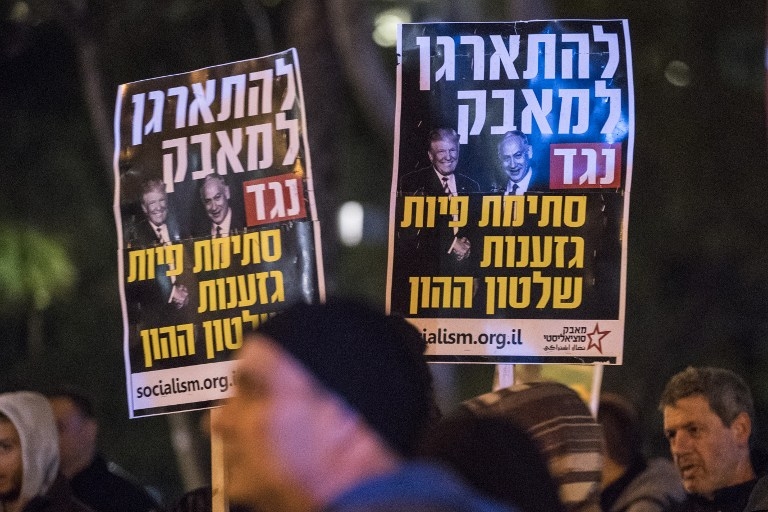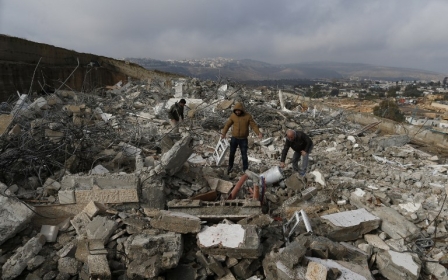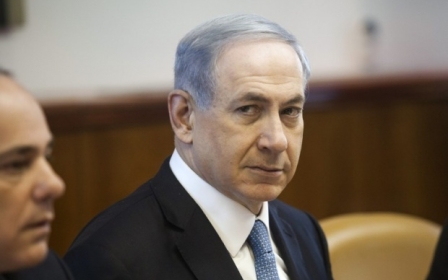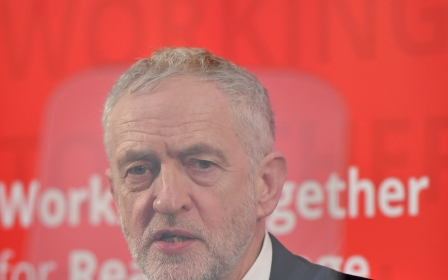Israel pursues all crimes of its leaders except the real one: Occupation

A dark cloud is hanging over the political future of Israel’s prime minister.
Benjamin Netanyahu is suspected of a series of crimes, mainly grouped into two case files. The first involves his acceptance of gifts from Israeli-American film producer Arnon Milchan.
The next few days will decide Netanyahu’s fate. If he is indicted, he will be subject to greater pressure to resign even though strictly speaking, by law, he is not obliged to do so
Worth tens of thousands of dollars and given over several years, Milchan's gifts reportedly included luxury cigars and champagne supplied to the prime minister’s residence. Milchan has business interests in Israel over which Netanyahu, who is also the state's minister of communications, has substantial influence. In one instance, Netanyahu allegedly intervened with US Secretary of State John Kerry to help procure a long-term US visa for Milchan. Netanyahu has already been questioned in the matter.
The second file is more complicated. The police obtained recordings of ongoing conversations between Netanyahu and another Arnon, Arnon Mozes, publisher and managing editor of Yedioth Ahronoth, until recently Israel’s biggest-circulation daily newspaper. The police obtained the recordings by chance in the course of a different case, while investigating a former aide to Netanyahu.
These recordings, recently leaked to the media, created a furor in Israel. The dialogue between the two, a serving prime minister and a leading publisher, sounds like a hard-nosed discussion between two cynical businessmen in the best case or, in the worst case, between two Mafia fraudsters. They are heard negotiating a quid pro quo whereby more favourable coverage in Yedioth Ahronoth of the prime minister would be repaid with certain benefits for the newspaper.
Newspaper wars
In the background is the free Israeli tabloid Israel Hayom, which began publication in 2007 and is underwritten by American casino mogul Sheldon Adelson. With free distribution, Israel Hayom is now the largest-circulation newspaper in the country, ousting Yedioth Ahronoth from first place both in circulation and in control of the advertising market.
Adelson, among Netanyahu’s closest and most devoted associates, founded Israel Hayom solely to help Netanyahu improve his image and counter the criticism to which Yedioth Ahronoth had subjected him. Adelson has already lost more than $700m on this publishing venture, but the paper’s success in terms of circulation and advertising has inflicted lethal damage on its rival, Yedioth Ahronoth – which lost substantial power, influence and income thanks to Israel Hayom.
We are talking here about relatively small-scale corruption: retail, rather than wholesale
In the past few years, the war between these two papers morphed into a war against Netanyahu, who stands behind Israel Hayom and greatly influences its content. When a new law in the Knesset proposing to outlaw free newspapers passed its first reading a few years ago, Netanyahu brought forward the date for new elections in order to kill the bill.
The recorded conversations between the PM and the publisher focused on achieving a ceasefire, such that Israel Hayom would reduce its circulation and Yedioth Ahronoth, in exchange, would give the PM more favourable coverage. The resolution discussed by the two men defies belief: a prime minister attempts to get journalists he favours placed at Yedioth Ahronoth, while the publisher promises to ‘pamper’ the PM in his newspaper, and so forth.
The scandal is making waves, far-reaching and furious, with new details emerging daily to amplify the embarrassment. Israeli Attorney General Avichai Mandelblit, who is also the chief prosecutor in Israel, must decide soon whether or not to indict Netanyahu for the crimes of corruption and breach of trust in both cases being investigated, in only one of them, or in neither.
The feeling right now is that Mandelblit will have no choice but to put the PM on trial. Mandelblit is a former cabinet secretary and one of Netanyahu’s closest aides, which serves only to complicate matters and intensify suspicions about a lack of integrity.
The next few days will decide Netanyahu’s fate. If he is indicted, he will be subject to greater pressure to resign even though strictly speaking, by law, he is not obliged to do so. It seems doubtful that he could adequately counter the political and public pressure and remain in office.
Small time corruption
This is not the first time that Netanyahu has been suspected of crimes, but thus far, the files have always been closed without going to trial. His wife, too, is currently the subject of a criminal investigation.
Netanyahu’s predecessor, former PM Ehud Olmert, is currently serving a prison term for corruption. Two previous prime ministers, Ariel Sharon and Ehud Barak, were investigated in the past for suspected criminal acts but did not stand trial. Another former PM, the late Yitzhak Rabin, resigned during his first term in office because of a then-prohibited foreign bank account he maintained.
The only soldier to be put on trial for the crimes committed in Gaza was a soldier who stole a credit card from a private home
Israel also has a former president convicted of rape, a finance minister and an interior minister convicted of corruption and sent to prison, a few legislators convicted of crimes and even a former chief rabbi currently set to stand trial for very serious financial wrongdoing.
Is Israel a corrupt state? Yes and no. It is corrupt enough to produce these numerous indictments of its elected public servants, yet still comparatively clean in that it fearlessly puts on trial and punishes even its most senior politicians.
We are talking here about relatively small-scale corruption: retail, rather than wholesale. Nonetheless, these comparatively petty acts of personal corruption must not be glossed over. They must be taken seriously because they are serious and point to a spreading decay.
Netanyahu’s conduct, for example, not just on the criminal level but also in the public realm, suggests unacceptable imperial norms of ‘l’etat, c’est moi’, a lack of distinction between public money and private, and a general sense of supreme executive entitlement. It is just as well that law enforcement figures are battling this; they have not always been uncompromising in their opposition to crimes committed by public servants in Israel.
Likewise, in Netanyahu’s case, the attorney general appears to be doing everything he can to delay and defang the investigation and postpone any indictments. The tapes of Netanyahu and Mozes, for example, were in the AG’s possession for six months before anything was made public.
The trials never held
But beyond all that, another, even heavier cloud looms – one that no one dares mention. The elephant in the room is the institutionalised state corruption arising from a 50-year-old occupation, to which no one ever alludes.
PM Ehud Olmert was sent to prison for pocketing a few hundred thousand dollars. He was never put on trial for his role in Operation Cast Lead in Gaza, a brutal assault by Israel on a helpless population that killed thousands of innocent civilians, including women and children and the elderly and the sick, and reduced thousands of their homes to rubble.
Israel also likes to busy itself dealing with relatively trivial matters: a show trial for a junior soldier who shot a dying Palestinian who had attempted to stab a soldier here is seen as proof of Israel’s moral stature
No one thought to indict Olmert over Cast Lead, nor over the devastation sown by his directives in the war he waged on Lebanon. The only soldier to be put on trial for the crimes committed in Gaza was a soldier who stole a credit card from a private home, and the same dynamic was evident at the apex of the government: war crimes, breaches of international law, crimes of occupation and illegal settlements which collectively are one huge, contemptuous and contemptible violation of international law – no one in Israel has been put on trial for any of that.
Israel likes to portray itself as a democratic country, a nation of law: the only democracy in the Middle East. Israel also likes to busy itself dealing with relatively trivial matters: a show trial for a junior soldier (Elor Azaria) who shot a dying Palestinian who had attempted to stab a soldier made headlines here as proof of Israel’s moral stature as a nation. The evacuation of a few buildings at the Amona settlement – likewise.
But the focus on minor corruption and trivial crimes distracts attention from the main thing: the conduct of an occupation that is the source of all the corruption in, and the criminal acts of, the state of Israel, to which no other crime is comparable. That no one is put on trial or punished for this, while Israel is busy with its minor corruption cases, is troubling and bodes ill.
It must be emphasised: the war on corruption in Israel is important. Its importance should not be minimised. Fighting corruption is important in fashioning the character and image of what is still a relatively young country. But one must strive to maintain proper perspective: Israel takes steps against things on the order of magnitude of a toothache – a necessary task – while entirely ignoring the more difficult and serious battle against the fatal disease afflicting it.
- Gideon Levy is a Haaretz columnist and a member of the newspaper's editorial board. Levy joined Haaretz in 1982, and spent four years as the newspaper's deputy editor. He was awarded the 2015 Olof Palme human rights prize and was the recipient of the Euro-Med Journalist Prize for 2008; the Leipzig Freedom Prize in 2001; the Israeli Journalists’ Union Prize in 1997; and The Association of Human Rights in Israel Award for 1996. His new book, The Punishment of Gaza, has just been published by Verso.
The views expressed in this article belong to the author and do not necessarily reflect the editorial policy of Middle East Eye.
Photo: Israeli left-wing supporters hold banners against corruption and racism during a rally against Israeli Prime Minister Benjamin Netanyahu and government policies, on 14 January 2017, at the Rabin Square in the city of Tel Aviv on the eve ahead of the Paris talks (AFP)
This article is available in French on Middle East Eye French edition.
New MEE newsletter: Jerusalem Dispatch
Sign up to get the latest insights and analysis on Israel-Palestine, alongside Turkey Unpacked and other MEE newsletters
Middle East Eye delivers independent and unrivalled coverage and analysis of the Middle East, North Africa and beyond. To learn more about republishing this content and the associated fees, please fill out this form. More about MEE can be found here.





